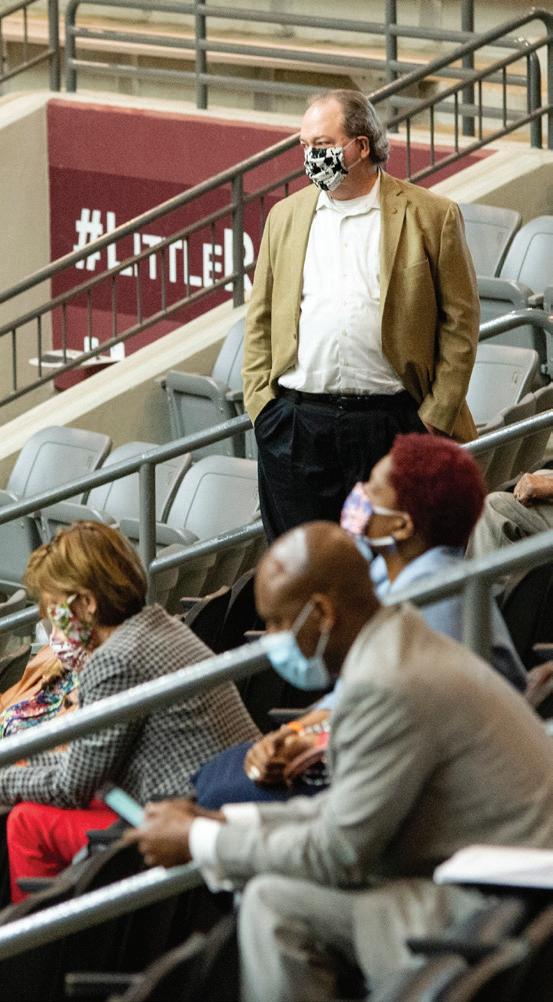
5 minute read
Legislative Update: Coronavirus
CORONAVIRUS FORCES
SPECIAL SESSION, SOCIALLY DISTANT FISCAL SESSION LEGISLATIVE UPDATE:
Advertisement
SPECIAL SESSION
On March 24, as the number of positive COVID-19 cases and claims for unemployment mounted, Governor Hutchinson called the General Assembly into a three-day Special Legislative Session to address a $353 million shortfall in the current fiscal year which ends June 30, 2020. This shortfall was due to the loss of state revenues as well as the delaying of the state individual tax filing deadline from April 15 to July 15 which the Governor announced in March to align with a previously announced delay in federal tax filing.
The Special Session began on March 26. The coronavirus outbreak had closed the State Capitol building to the public for weeks. The House and Senate practiced social distancing protocols. To accomplish these, House members met in the Jack T. Stephens sports arena at the University of Arkansas Little Rock campus and the Senate met in the Capitol with Senators spread out across their chamber and sitting in the gallery where the public usually observes the Senate’s activities. Lawmakers quickly advanced identical versions of legislation (HB1001 and SB2) which:
• Set up a transfer of $173M in the General Revenue Allotment Reserve fund to a special COVID-19 Rainy Day Fund to address needs created by the COVID-19 crisis.
• Created a panel of legislative leaders to oversee expenditure requests from this new COVID-19 Rainy Day Fund.
Just after 1 am on Saturday, March 28, Governor Hutchinson signed the legislation into law ending the Special Session. Days later, three lawmakers tested positive for COVID-19 .
FISCAL SESSION
Lawmakers returned to Little Rock on April 8 to begin the constitutionally required Fiscal Legislative Session. The number of Arkansans testing positive and dying from COVID-19 continued to increase, as did the number of unemployment claims which were expected to top 150,000 by week’s end. In the days prior to the session, Governor Hutchinson announced that the state’s revenue forecast would be adjusted down by $200M due to the anticipated loss of revenues as the state grapples with the coronavirus outbreak.
The Capitol remained closed to the public throughout the session, and lawmakers continued to observe social distancing protocols. During the legislative committee meetings as well as floor sessions, lawmakers donned masks and sat 6 feet apart as they carried out their business. The primary purpose of the Fiscal Session is to debate and approve a state budget for the following

fiscal year. The Fiscal Session which typically lasts around 30 days, was conducted in an abbreviated manner, wrapping up after just 8 days on April 16 as COVID-19 positive cases topped 1,600 in the state.
The budget lawmakers passed will be used to appropriate funds to operate state government—including public education. Fortunately, most state funding for public education is constitutionally protected. This means most of the cuts will occur in other parts of the state budget.
At the opening of the session, Governor Asa Hutchinson took to the floor of the state Senate to give a brief State of the State Address. During his remarks, he noted lawmakers would need to significantly scale back the state’s budget to allow for essential state services to still be provided despite the loss of revenue.
Importantly, the Governor noted that the state would maintain the commitment to funding public education. He added that nothing
beats face to face instruction but said technology can help educators to continue to connect with students. He also acknowledged there is a need to improve our broadband connectivity across Arkansas. The Governor also recognized the contributions education support professionals, such as child nutrition workers and school bus drivers are making to ensure meals are still being prepared and delivered to students across Arkansas.
The Revenue Stabilization Act (Senate Bill 83 and an identical House Bill 1096) known as the RSA, is the bill that contains the appropriations for state for fiscal year 2021. The bill also serves as a mechanism by which lawmakers set up funding priorities using various categories: A, A1, B, C and D, with category “A” being the highest funding priority. Items in category D are currently unfunded. The bill also provides for the recommended educational adequacy funding increase of 1.48%.
Fiscal Year 2021 appropriations for K-12
The RSA allocates $2.23 billion to the public school fund and receives $2.22 billion in categories A, A1, B and C. Category D is unfunded and that includes $11.5 million of the public school fund.
Fiscal Year 2021 appropriations for Higher Ed
The RSA allocates $755.1 million and provides $717.5 million in funding for public institutions of higher education in categories A, B and C. Higher education funding in the unfunded category D includes $37.7 million. The University of Arkansas, Fayetteville was allotted $122.8 million, including $116.7 million in categories A, B and C. It also includes an appropriation of $6.1 million, but that amount is in the unfunded category D.

During the session, the Joint Budget Committee approved Gov. Hutchinson’s requests to tap the rainy-day and restricted reserve funds for $3.4 million for 18 public higher-education institutions that lost state funds in fiscal 2020 because of budget cuts and the productivity funding model. The formula rewards higher education institutions based on graduation rates.
House Speaker Matthew Shepherd, R-El Dorado, said that law, adopted by the Arkansas legislature in 2017, isn’t drafted well and Hutchinson’s requests to use the funds represent “a compromise” to keep the higher education incentive funding model and help colleges and universities that lost revenue under the productivity funding model. The largest beneficiaries of using the funds include the University of Arkansas at Little Rock, the University of Arkansas at Monticello, Arkansas State University-Jonesboro and the University of Arkansas-Pulaski Tech College.
The committee also gave permission to tap the rainy-day fund for $1.5 million more by June 30, 2021 if necessary. Altogether, the Governor requested $2.54 million from the restricted reserve fund and $2.4 million from the rainy-day fund.
Lawmakers returned April 24th for sine die adjournment.
LEGISLATIVE LEADERSHIP ELECTED
In addition to approving the budget, legislators also held elections for the leadership of their respective chambers. Rep. Matthew Shepard, R, El Dorado was unopposed in his bid for a second term as Speaker of the House and in a surprise result, Sen. Jimmy Hickey, R, Texarkana defeated Sen. Bart Hester, R, Cave Springs to succeed Senator Jim Hendren as President Pro Tempore. Both men will begin their two-year terms in January 2021. AEA looks forward to working with both legislative leaders as our attention turns to the General Legislative Session which will convene in 2021.
As always, AEA leadership and staff stayed in contact with legislators and state officials while monitoring legislative activities, reviewing education-related budget bills and continuously representing our members throughout the 2020 Fiscal Session.








